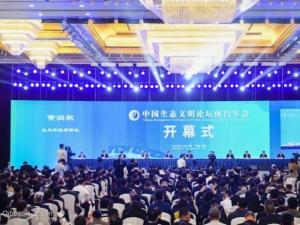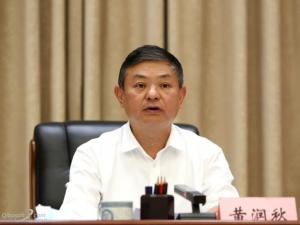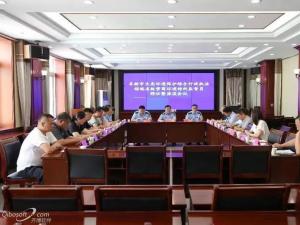AN eva lUATION OF THE CHINESE LEGAL SYSTEM(一)
|
FRONTIERS OF LAW IN CHINA VOL. 8 MARCH 2013 NO. 1 DOI 10.3868/s050-002-013-0004-7 AN eva lUATION OF THE CHINESE LEGAL SYSTEM ON SUSTAINABLE DEVELOPMENT Ke Zhou,* Shan Ouyang,** Jiangyuan Fu*** The philosophy of binary purpose in conjunction with a holistic approach reflects sustainable development. These ideas are in accordance with Chinese traditional philosophy and culture, as well as the contemporary economic and social development. It calls for the central government’s support to achieve sustainable development at the initial stage. However, in the long run, this approach has drawbacks which are concealed. Thus, prompt adjustment is needed. In the relationship between the systems of sustainable development and democracy, human rights, sovereign equality of states, and sustainable development are approbated by the Chinese law system. The bottleneck of sustainable development is linked to its ideological system. Integration is related to the bottleneck of binary purposes, good governance, public participation, and human rights. The government-oriented mechanism has a time element that is related to the bottleneck of utilitarianism and basic economic law. For China’s sustainable development, breaking the bottleneck to improve the system and seizing the opportunity to make innovations are of great significance. The focal points now for China are the perfection of legislation, supervision to government, encouraging public participation and empowering them with legal rights. Chinese government is taking green economy as a new action of implementing sustainable development. It stems from both domestic and international pressures which deepen the * Ph.D and Professor of law, at School of Law, Renmin University of China, Beijing, China. His research covers civil law, economic law, and environmental and resources law. Contact: rdzhouke@x263.net ** Ph.D candidate, majoring in environmental law, at School of Law, Renmin University of China, Beijing, China. Contact: 857574523@qq.com *** Master candidate, majoring in environmental law, at School of Law, Renmin University of China, Beijing, China. Contact: erinyuan8964@hotmail.com The authors are grateful to Shanshan Li, Wei Luo, Yuan Gao, Xiaoxiao Lin, Yichen Wang, Huicong Zhang, Meishu Wang, and Lineke Tak for their dedication to research and translation; also many thanks to the Institute of Low-Carbon Economy and Climate Change at Renmin University of China. 104 FRONTIERS OF LAW IN CHINA [Vol. 8: 103 economic reform required to switch the economic development mode. These pressures are bringing new opportunities and vigor to China’s sustainable development. INTRODUCTION........................................................................................... 104 I. eva lUATION OF THE LEGAL SYSTEM OF CHINA ON SUSTAINABLE DEVELOPMENT............................................. 110 A. Priority Position............................................................................ 110 B. Time............................................................................................... 111 C. Levels of Regulations .................................................................... 111 D. Fields of Regulations .................................................................... 112 E. eva luation Methods....................................................................... 112 F. eva luation Standards..................................................................... 113 II. BOTTLENECK OF CHINA’S SUSTAINABLE DEVELOPMENT ........................................................................................................... 114 A. Puzzles of Binary Purposes: Choice between Weak and Strong Sustainable Development ................................................... 115 B. Failure of the Government-Led Mechanism.................................. 116 C. Basic Economic Laws of Utilitarianism and Socialism ................ 118 III. IMPROVEMENT AND OUTLOOK ............................................... 119 A. Valuing Legislation........................................................................ 119 B. Green Economy Infuses New Vigor to Sustainable Development.................................................................................. 121 CONCLUSION ...............................................................................................123 INTRODUCTION (1) Identification of binary purposes and basic concepts. China and the Western countries show a high conformity on the issue of sustainable development, despite the divergences in traditional concepts of economic and social development. Sustainable development is a development that meets the needs of the present without compromising the ability of future generations to meet their own needs.1 The Rio Declaration issued by the United Nations in June 1992 proclaimed 27 principles, among which sustainable development 1 V. Lowe, Sustainable Development and Unsustainable Arguments, in A. Boyle & D. Freestone eds., International Law and Sustainable Development Past Achievements and Future Challenges, Oxford University Press (Oxford), at 31 (1999). 2013] CHINESE LEGAL SYSTEM ON SUSTAINABLE DEVELOPMENT 105 was repeatedly mentioned. It is generally acknowledged that sustainable development is the fruit of Western civilization. Nevertheless, divergences regarding this concept exist in Western academic circles. For example, some scholars believe: “Sustainable development is a universal concept, but its operationalization is viable only in a defined micro geopolitical unity, limited in space and time. It is valid for local eco-social systems with respect for regional peculiarities. It may only be applicable to closed systems, where the harvest of surplus energy does not overstep the carrying capacity of the system. In its current use, the expression sustainable development lost its true meaning to become a commercial and political jargon, and a plea to the preservation of landscapes.”2 However, sustainable development is recognized universally and academically with little contest. In fact, the philosophy of binary purposes (i.e. economic development and environmental protection) and plural purposes (i.e. generational and intergenerational equality, economy, society, environment, and resources) reflect that sustainable development laws are in accordance with Chinese traditional philosophy and culture, as well as the contemporary economic and social development. When the concept of sustainable development was put forward, the environmental law of most countri |
我来说两句
已有0评论 点击全部查看






